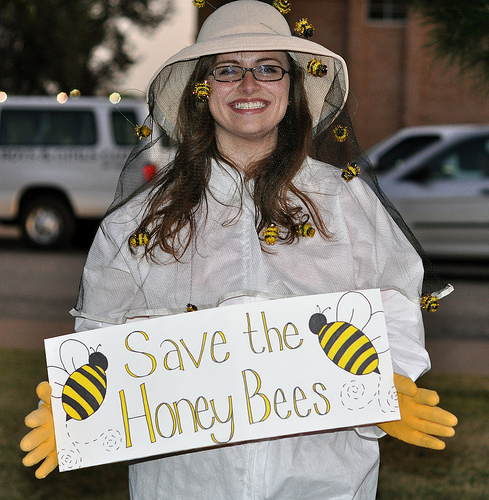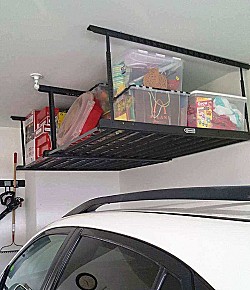Tips for Producing Honey at Home
 Here at Networx, we’re big fans of bees and other pollinators because they’re great for the environmentnand great for the garden. In the case of bees, there’s a little side bonus: fresh homemade honey!
Here at Networx, we’re big fans of bees and other pollinators because they’re great for the environmentnand great for the garden. In the case of bees, there’s a little side bonus: fresh homemade honey!
Keeping bees can be easy and fun, and provides a great source of natural honey for the whole family (except children under one, who shouldn’t have honey because it could cause infant botulism). You might just find yourself getting a little passionate about apiculture along the way.
We talked with Mark Jensen, President of the American Honey Producer’s Association and owner of the Smoot Honey Company, about getting started with bees. He says the biggest and most important thing to be aware of for beginning beekeepers is that patience is critically needed while you’re getting set up: “Starting out as a beekeeper, it's important to be patient. Things don't always go as easily as you think they should.”
A few things can make the learning curve a lot easier on you. He highly recommends reaching out to hobby beekeepers groups and other local organizations to connect with people who are also keeping bees, and notes that: “There are many commercial beekeepers around the country, but they are not always around—out working in the bees or traveling to California, for example—and don't always have time or maybe the perspective of a smaller beekeeper.” Meeting up with local groups can help you
learn more about the specifics of your environment so you can give your bees the best care possible. Online extension courses are also available from some colleges and universities for people who want to learn the basics without traveling to a campus.
When you’re ready to get started with bees, take advantage of the experience offered by a firm that caters to hobby apiculturists, Jensen explains. “...there are several bee supply houses across the country, including Mann Lake Ltd., Walter T. Kelley Co., Dadant, and Brushy Mountain Bee Farm, for example, that have knowledgeable staff who can help new beekeepers with questions regarding the types of equipment needed, what to do and when, etc. Some of these places are suppliers of bees and queens or can direct you where to get your bees. Most ‘new’ bees will come from southern states like California, Texas, Louisiana and Florida.”
The staff at these companies are passionate about bees, as I discovered when I talked to John Dufner at Mann Lake Limited, a company that supplies bees and equipment to hobbyists and commercial beekeepers. Dufner explained that Mann Lake provides a full range of products for beekeeping needs ranging from the hobbyist to the commercial bee industry, and they’re all tested on the company’s premises.
For beginning beekeepers, he stressed that: “Any time that you are able to get involved with a local association, that’s awesome. That’s where you’re going to get the most information.” Reading about bees can be helpful, he says, but it’s hard to beat mentors who have been keeping bees for as long as 40 years. He cautioned that sometimes walking into association meeting as a new beekeeper can be intimidating, because “you might ask a question and get ten different answers,” but the wealth of experience and knowledge are invaluable for people who are just getting started.
Mann Lake, along with other companies with products aimed at hobbyists, carries basic starter kits for new beekeepers. These include protective clothing, hardware, and other supplies. While it may be necessary to buy feed, medications, and extraction equipment to get honey from the hives over the course of the first year of beekeeping, the base kit gets people set up so they can start, and Mann Lake’s kit also comes with a detailed guide to assist new customers.
He notes that the two key things hives need to stay healthy and productive are pollen and nectar. Bees can collect between 80 and 100 pounds of pollen each year during the collection season, and that’s on top of their nectar requirements. If necessary, they’ll range up to three miles from the home hive to find the nutrition they need, and it’s up to the beekeeper to makes sure the bees can access the necessary food.
Pollen substitutes and sugarwater are available to promote hive health in regions where the local environment doesn’t provide enough to meet the needs of the hive. Dufner also told me that in the fall, when the hive needs to prepare for winter weather, some beekeepers will collect minimal amounts of honey for their own needs or those of neighbors, leaving the rest of the honey on the hive to support the colony. “Honey,” he said, “is the best food for honeybees.”
He also explained that colonies in the Northern and Midwestern regions can have trouble making it through the winter because of more extreme weather. It’s important to have lots of young bees so the colony will survive the cold season, and to be aggressive about pest management to keep the hives healthy. A range of mites, parasites, and viruses can affect bees; varroa mites in particular are a problem because they can be destructive inside the hive in addition to carrying viruses. In the commercial industry, according to Dufner, they’re “the one worst thing the industry has to look at,” illustrating how devastating they can be.
Treatments are available for use in spring and fall to control pests in the hives. Dufner also recommends networking with local beekeepers and organizations to find out who in the area keeps bees and work on an integrated pest plan. If beekeepers stay in communication, they can identify signs of sickness in their hives early and work to prevent the spread of disease to neighbors.
All this can seem a little intimidating, but the rewards of beekeeping are worth it!
The fun part of bees, as we know, is the honey, and Mark Jensen explained that hobby beekeepers have one advantage here over commercial operations like his: “Harvesting honey is hard work if you have thousands of hives. Hobby beekeepers will enjoy the benefits of having only maybe a few dozen honey supers to ‘pull’ when the time comes, instead of multiple thousands.”
It’s still work, though, and you need to exercise caution while working with your bees. “Once the supers are full, or the honey flow has stopped, beekeepers can take the honey off the bees, which is sometimes called ‘pulling honey’ or ‘robbing.’ This involves wearing a bee suit, including coveralls, veil and gloves. The bees generally don't take kindly to having their food stolen by somebody in a white suit and indicate as much by stinging and stinging to protect the hive from the intruder.”
For those who are nervous about this stage of beekeeping, this is where local hobbyist groups can come in. Experienced beekeepers are often happy to mentor, and some groups offer classes and provide instructional materials and opportunities to practice under supervision. This can be a great confidence-building exercise before people take the plunge with their own bees.
While you’re at it, you can also landscape for your bees. Jensen explained to me that “Most plants that bees visit will produce some sort of nectar. Some plants produce more than others and those will be the ones bees tend to frequent as those plants give more bang for the buck, so to speak. Of course, not all honey is created equal in flavor, but that's all in the taste buds.” The nectar they consume has an impact on flavor; clover, alfalfa, eucalyptus, avocado, orange blossom, and sage all produce distinctive flavors in honey and you can experiment with landscaping to find the flavor you want while adding color and texture to your garden. Databases like this one for Ithaca, New York also track which plants yield useful flowers and when to help beekeepers find out what their charges are eating.
Research also suggests that for people with seasonal allergies, consuming raw local honey like that from your own hives may help build up an immune resistance to make allergies less severe, which is yet another benefit of making your own honey!
As if the benefits to you weren’t enough, your bee-friendly landscaping will also attract other pollinators and benefit the neighborhood as a whole. Meanwhile, as your bees wander, they’ll pollinate other plants and improve gardens in your community. If you have neighbors who are nervous about your hive or hive, make sure they know that honeybees don’t sting without provocation; since they die after stinging, it’s a last-ditch resort that they’ll use only when feeling extremely threatened.
Honeybee swarms, where bees seek a new nesting site, can happen, and they make look scary; a cloud of bees buzzing through the air is enough to make anyone a little nervous! However, bees are not usually aggressive while swarming because they don’t have a hive to protect, and a swarm can collected and managed by a professional apiculturist. Fortunately, there are some measures you can take to prevent swarms, which should keep your hives healthier and maintain peace in the neighborhood.
Managing your hives requires keeping your eye on what’s happening in them. Look out for signs of crowding and confusion, which can be a precursor to a swarm. One option to prevent swarms is to clip one of the queen’s wings so she’s unable to fly, which will keep the hive close to home. You can also remove the frame with the old queen, inspect the rest of the hive for any queen cells and destroy
them, and set it up above the queen’s frame. As bees forage, they will drift into the lower hive with the queen, and the swarming instinct will be suppressed. Check again in two weeks for new queen cells and destroy those to ensure the hive doesn’t attempt a split.
You can also arrange your hives and honey frames in a variety of ways that are designed to prevent swarms by tricking the colony into thinking it has no reserves or keep nurse bees working. The best option for you can depend on your comfort level and experience, and working with an experienced mentor can help you decide on the ideal hive management technique.
Above all, the important thing for would-be beekeepers is to have fun while staying safe and getting to know their charges.
s.e. smith writes about Bay-area remodeling and green living for Networx.
Looking for a Pro? Call us (866) 441-6648

Landscaping Average Costs
Landscapers Experiences

Roof Repair That Keeps The Snow Out Of Our Attic

Garage Storage Shelf Installation By An Exceptional Handyman



